Eight on faculty receive DSPs, Named Chairs
Three members of the University faculty have been named distinguished service professors, while five other faculty members have received named professorships.
The three faculty members who have received distinguished service professorships are: James Chandler, the Barbara E. and Richard J. Franke Professor in English Language & Literature, and the College; Martha Roth, Professor in the Oriental Institute and the College; and Richard Strier, the Frank L. Sulzberger Professor in English Language & Literature, and the College.
James Chandler, the Barbara E. and Richard J. Franke Professor in English Language & Literature and the College, now has the distinction of Distinguished Service Professor added to his named professorship.
Director of the Franke Institute for the Humanities, Chandler is also a leading authority on the romantic movement in England. His broad scholarly interests include 18th- and 19th-century British Literature, Irish Literature, critical theory and film.
Chandler, who began teaching at the University in 1976 while completing his Ph.D. in English Language and Literature, is known for authoring the critically acclaimed book England in 1819: the Politics of Literary Culture and the Case of Romantic Historicism (1998).
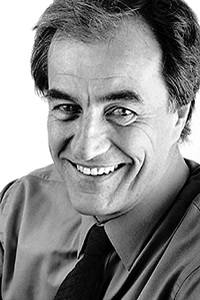 James Chandler | |
Chandler also has published a book on the poetry and politics of Wordsworth, titled Wordsworth’s Second Nature: A Study of Poetry and Politics. He has co-edited Questions of Evidence: Proof, Practice, and Persuasion Across the Disciplines (1992), Romantic Metropolis (2006), and the forthcoming Cambridge Companion to Romantic Poetry (2007). He is the editor of two series, Cambridge Studies in Romanticism and Literature in History and Literature in History.
Chandler, who joined the Chicago faculty in 1978, is the recipient of awards from the Fulbright Foundation, the National Endowment for the Humanities, the American Council of Learned Societies, the Danforth Foundation, as well as the ler degré francais from the University of Grenoble.
He is currently completing work on The Cambridge History of British Romantic Literature and writing a book about the long history of sentimental mode in literature and cinema.
Chandler received his B.A. from the University of Notre Dame and his M.A. and Ph.D., both with honors, from Chicago.
Martha Roth, a leading expert on the ancient languages of Mesopotamia, has been named the first Chauncey S. Boucher Distinguished Service Professor in Near Eastern Languages, the Oriental Institute and the College.
Boucher was a faculty member in the History Department who also served as Dean of the College from 1926 to 1935.
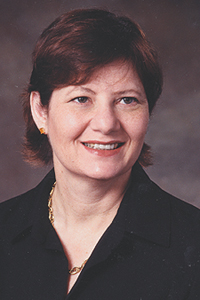 Martha Roth | |
Roth, who was named Deputy Provost for Research and Education in 2004, is the editor-in-charge of the 26-volume Chicago Assyrian Dictionary. Her research focuses on the legal and social history of the ancient Near East, with her primary interests being family law, women’s legal and social issues, and the compilation and transmission of laws.
A recipient of fellowships and grants from the National Endowment for the Humanities and the American Council of Learned Societies, she currently is working on a project on Mesopotamian legal cases.
Her books include The Series An-ta-gal shaqu, Materials for the Sumerian Lexicon 17 (1985); Babylonian Marriage Agreements, 7 th-3rd Centuries B.C. (1989) and Law Collections from Mesopotamia and Asia Minor (1995, 1997, 2000).
Roth received a B.A. in Near Eastern studies from Case Western Reserve University in 1974 and her Ph.D. from the University of Pennsylvania’s department of Oriental studies in 1979.
Richard Strier, the Frank L. Sulzberger Professor in English Language & Literature, and the College, has been named the Frank L. Sulzberger Distinguished Service Professor.
As a literary scholar with a deep interest in the intellectual history of the early modern period, Strier’s chief interest has been to bring together two modes of literary study that have traditionally been seen as antagonistic: formalism and historicism.
Strier, who has taught at the University since 1973, and was Master of the Humanities Collegiate Division from 1989-1992, has written extensively on how the theological and political ideas of the early modern period have found their way into the literature of the period. He is the author of several books and collection, including Resistant Structures: Particularity, Radicalism, and Renaissance Text; Love Known: Theology and Experience in George Herbert’s Poetry; and with Derek Hirst, a historian,Writing and Political Engagement in Seventeenth-Century England.
Strier, an expert on 17th-century English poetry, published “John Donne Awry and Squint: The ‘Holy Sonnets,’ 1608-1610,” in Modern Philology in 1989. The essay was the scholarly basis and inspiration for the play Wit, in which he was mentioned by name; the play won the 1999 Pulitzer Prize in Drama.
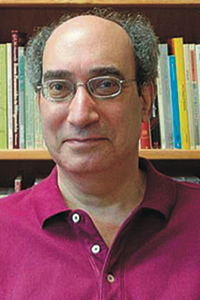 Richard Strier | |
Strier was the Fannie Hurst visiting professor at Brandeis University in 1992-1993 and also taught at the City College of New York. In 2000, he was awarded a research fellowship from the Folger Shakespeare Library, and from 1995 to 1998 he was a member of the Board of Directors for the Mellon Foundation’s “Confrontations with the Other” seminars, in which he directed the first year of seminars on Early Modern Others. He is currently the editor of the journal, Modern Philology.
Strier received a B.A. with highest honors from the City College of New York in 1966, and both his M.A. in 1967 and his Ph.D. in 1976 from Harvard University, where he won the Bowdoin Prize for the Humanities.
Current faculty members who have received named professorships are: Emily Buss, Professor in the Law School; Bernard Harcourt, Professor in the Law School; Jeffrey Matthews, Professor and Chairman of Surgery; Mitchell Posner, Professor in Surgery; and Roy Weiss, Professor in Medicine.
Emily Buss has been named the first Mark and Barbara Fried Professor in the Law School. Buss is also the Kanter Director of Chicago Policy Initiatives, leading a project designed to improve the legal system’s treatment of foster children after they reach the age of 18.
Her research interests include children’s and parents’ rights and the legal system’s distribution of authority and responsibility among parent, child and state. Buss teaches civil procedure, evidence and courses that address the legal treatment of children.
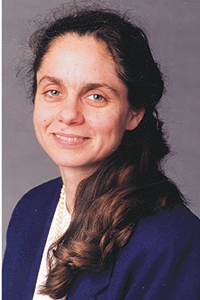 Emily Buss | |
Buss clerked for U.S. Supreme Court Justice Harry A. Blackmun and for Judge Louis H. Pollak of the U.S. District Court for the Eastern District of Pennsylvania. She was a staff attorney in the Child Advocacy Unit of the Maryland Legal Aid Bureau and was deputy director of the Juvenile Law Center in Philadelphia before joining the University of Chicago Law School.
Buss received her B.A. summa cum laude from Yale University and her J.D. from Yale Law School.
Bernard Harcourt has been named the Julius Kreeger Professor of Law and Criminology in the Law School. Harcourt’s work focuses on issues of crime and punishment from an empirical and social theoretic perspective. His research intersects criminal law and procedure, police and punishment practices, political and social theory, and criminology.
Harcourt is the author of Language of the Gun: Youth, Crime and Public Policy, Illusion of Order: The False Promise of Broken-Windows Policing and, currently, Against Prediction: Punishing and Policing in an Actuarial Age. Harcourt also is the editor and a contributing author to a collection of essays called Guns, Crime and Punishment in America, and the journal The Carceral Notebooks.
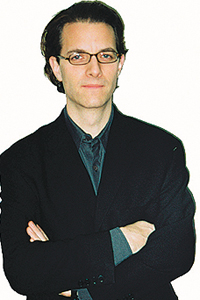 Bernard Harcourt | |
Before joining the Law School, Harcourt was a faculty member at the University of Arizona College of Law, and a visiting professor at Harvard Law School and New York University School of Law.
Harcourt earned B.A. in political theory from Princeton University and his law degree from Harvard University. He also received a Ph.D. in political science from Harvard University.
Jeffrey Matthews, who joined the University faculty this fall as Chairman of Surgery, has been named the Dallas B. Phemister Professor in Surgery.
A leading authority on the surgical treatment of diseases of the pancreas, bile ducts and liver, Matthews was the Christian R. Holmes professor and chairman of surgery, and a professor of molecular and cellular physiology at the University of Cincinnati College of Medicine before coming to Chicago.
An active clinical surgeon, Matthews’ expertise is in pancreatitis, bile duct reconstruction and complex re-operative gastrointestinal surgery. His laboratory research focuses on the mechanisms used by epithelial tissues to regulate salt secretion, which goes awry in several diseases, including cystic fibrosis and many forms of diarrhea.
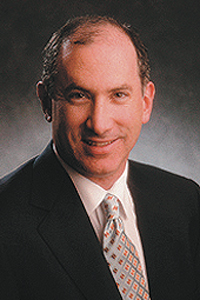 Jeffrey Matthews | |
He began his residency at Harvard’s Beth Israel Hospital in 1985, spent a year as a fellow in hepatobiliary surgery at the University of Bern, Switzerland, then returned to serve as chief resident at Beth Israel from 1990 to 1991. He then served as a research fellow in pathology at Harvard’s Brigham and Women’s Hospital. He joined the Harvard faculty as an assistant professor of surgery in 1992 and became an associate professor in 1996. In 2001, he was appointed professor and chairman of surgery at Cincinnati and surgeon-in-chief at Cincinnati’s University Hospital.
Matthews is a 1981 cum laude graduate of Harvard College and earned his M.D. from Harvard Medical School in 1985.
Mitchell Posner, Professor in Surgery, has been named the Thomas D. Jones Professor.
Posner specializes in the surgical treatment of cancers of the esophagus, stomach, liver, pancreas, colon, and rectum and has designed and directed numerous clinical trials to assess new therapies for gastrointestinal cancers. He also studies molecular genetic events and gene therapy as well as innovative treatment approaches aimed at novel targets necessary for tumor growth.
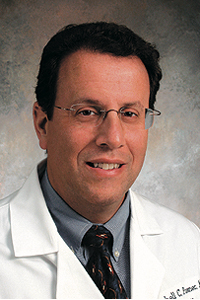 Mitchell Posner | |
Although primarily known as a clinician, Posner has authored or co-authored over 100 book chapters and journal articles and served as editor for four books about the biology, genetics and treatment of gastrointestinal cancers. He serves on the editorial boards of several journals, including the Journal of the American College of Surgeons, Surgery Annals of Surgical Oncology and the American Journal of Surgery.
Posner also holds national committee positions for the National Cancer Institute, the American College of Surgeons, the American Society of Clinical Oncology and the Society of Surgical Oncology, where he is currently treasurer. He has won many awards for research and for teaching, including the American Society of Clinical Oncology Merit Award and multiple “top doctor” awards.
Posner completed his surgical residency at the University of Colorado in 1987 and a fellowship in surgical oncology at Memorial Sloan-Kettering Cancer Center in 1988. After seven years at the University of Pittsburgh, he came to Chicago in 1995.
Posner received his B.S. in zoology from the University of Michigan in 1977 and his M.D. from the State University of New York, Buffalo, in 1981.
Roy Weiss, Professor in Medicine, has been named the first Rabbi Morris I. Esformes Professor. Esformes, a grateful patient and friend of the University, gave $2.5 million to support the professorship, which will benefit endocrinology, pediatric surgery, gastroenterology, and radiation and oncology.
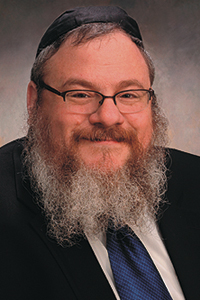 Roy Weiss | |
An authority on the genetics, biology and treatment of diseases of the thyroid and the pituitary, Weiss, along with colleague Samuel Refetoff, has described several genetic diseases of the thyroid. Together, they run one of the largest referral centers for genetic thyroid disease in the world. Weiss also leads one of the largest programs in the Midwest in the diagnosis and treatment of Cushing’s disease, a pituitary disorder.
Weiss serves on the editorial board of several journals and is an associate editor of the journal, Thyroid and of the Encyclopedia of Hormones. He has won many honors, including national awards from the March of Dimes and the National Institutes of Health as well as several teaching awards.
He completed his internship, residency and endocrine fellowship at Chicago and joined the faculty in 1990. Weiss rose quickly through the ranks, becoming a professor and program director of the Clinical Research Center in 2003 and chief of endocrinology in 2006.
He earned his B.Sc. in zoology from Duke University in 1975, his Ph.D. in cell biology from the University of South Carolina in 1978 and his M.D. from Sackler Medical School in Tel Aviv, Israel, in 1985.
![[Chronicle]](/images/sidebar_header_oct06.gif)